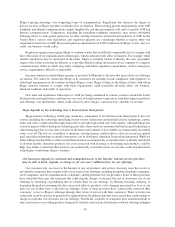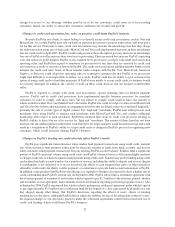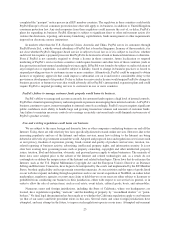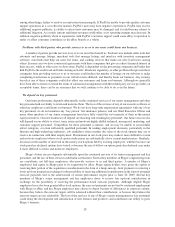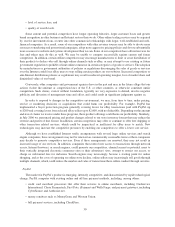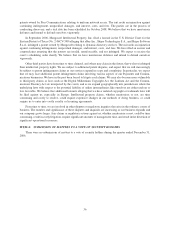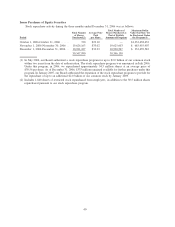eBay 2006 Annual Report Download - page 34
Download and view the complete annual report
Please find page 34 of the 2006 eBay annual report below. You can navigate through the pages in the report by either clicking on the pages listed below, or by using the keyword search tool below to find specific information within the annual report.• level of service fees; and
• quality of search tools.
Some current and potential competitors have longer operating histories, larger customer bases and greater
brand recognition in other business and Internet sectors than we do. Other online trading services may be acquired
by, receive investments from, or enter into other commercial relationships with larger, well-established and well-
financed companies. As a result, some of our competitors with other revenue sources may be able to devote more
resources to marketing and promotional campaigns, adopt more aggressive pricing policies and devote substantially
more resources to website and systems development than we can. Some of our competitors have offered services for
free and others may do this as well. We may be unable to compete successfully against current and future
competitors. In addition, certain offline competitors may encourage manufacturers to limit or cease distribution of
their products to dealers who sell through online channels such as eBay, or may attempt to use existing or future
government regulation to prohibit or limit online commerce in certain categories of goods or services. The adoption
by manufacturers or government authorities of policies or regulations discouraging the sales of goods or services
over the Internet could force eBay users to stop selling certain products on our websites. Increased competition or
anti-Internet distribution policies or regulations may result in reduced operating margins, loss of market share and
diminished value of our brand.
Conversely, other companies and government agencies have in the past and may in the future allege that our
actions violate the antitrust or competition laws of the U.S. or other countries, or otherwise constitute unfair
competition. Such claims, even if without foundation, typically are very expensive to defend, involve negative
publicity and diversion of management time and effort, and could result in significant judgments against us.
In order to respond to changes in the competitive environment, we may, from time to time, make pricing,
service or marketing decisions or acquisitions that could harm our profitability. For example, PayPal has
implemented a buyer protection program generally covering losses for eBay transactions paid with PayPal up
to $200 and covering losses from selected eBay sellers up to $2,000, with no deductible. Depending on the amount
and size of claims we receive under these programs, these product offerings could harm our profitability. Similarly,
in July 2006 we announced pricing and product changes related to our store inventory format that may reduce the
revenue and profits of that format. In addition, certain competitors may offer or continue to offer free shipping or
other transaction related services, which could be impractical or inefficient for eBay users to match. New
technologies may increase the competitive pressures by enabling our competitors to offer a lower cost service.
Although we have established Internet traffic arrangements with several large online services and search
engine companies, these arrangements may not be renewed on commercially reasonable terms or these companies
may decide to promote competitive services. Even if these arrangements are renewed, they may not result in
increased usage of our services. In addition, companies that control user access to transactions through network
access, Internet browsers, or search engines, could promote our competitors, channel current or potential users to
their vertically integrated electronic commerce sites or their advertisers’ sites, attempt to restrict our access, or
charge us substantial fees for inclusion. Search engines may increasingly become a starting point for online
shopping, and as the costs of operating an online store decline, online sellers may increasingly sell goods through
multiple channels, which could reduce the number and value of transactions these sellers conduct through our sites.
PayPal
The market for PayPal’s product is emerging, intensely competitive, and characterized by rapid technological
change. PayPal competes with existing online and off-line payment methods, including, among others:
• credit card merchant processors that offer their services to online merchants, including Cardservice
International, Chase Paymentech, First Data, iPayment and Wells Fargo; and payment gateways, including
CyberSource and Authorize.net;
• money remitters such as MoneyGram and Western Union;
• bill payment services, including CheckFree;
30


